"Dhak, dhol, jhajor baaje," we recite as children and there is no denying that the beats of the drums that we call 'dhak' has something robustly unique about it. Dhak is a familiar musical instrument that is native to the Indian subcontinent.
Aside from their uniquely loud palpitating beats, there are stories behind the sound. Stories that have always been there. Stories of the dhakis.
The dhak
The signature beat of a dhak is impossible to miss or confuse with anything else. We find many references to this in our literature and it's easy to understand why. Durga Puja does not sound so festive without the frenzied beats of dhak.
The instrument itself is of medieval origin but it is said that dhak was already in play during the Vedic period. The large instrument is made out of a wooden frame with a leather membrane stretched over the opening. The cylindrical or barrel-shaped membranophone is usually around three feet in size. Beating on the membrane creates a loud noise that has a different aura with the power to excite people. Perhaps this is why we often see dhak beats are accompanied by people dancing around them almost in a frenzy.
Ideally, a dhak is made out of mango wood. One can buy a dhak for around Tk 12,000. However, most dhakis prefer to make their own.
"Everything about dhak, whether it's creating a new one from scratch or repairing the current one, I do it myself. Sure, you can buy one at a shop and it won't be bad, but I would say that making one is so much better. You can make it just how you want it," said Ashit Das, a middle-aged dhaki from Pabna.
Sangkar Das from Munshiganj, a seasoned dhaki who has played at all sorts of festivals, had the same sentiment. "Doing everything myself is not only cheaper, it's just better. I can tweak the instrument how I want."
Our dhaki
Playing dhak is no easy task and takes years of practice. Most dhakis start with other instruments and later learn the workings and beats of dhak as they find their talent.
"You start with kashi and continue to practice. It brings fluidity to your hand movement. Later, you pick up the dhak," explained Ashit using terms like "haat khulte hobe".
Sangkar Das has been playing dhak at Mangal Shobhajatra, pujas, and many other festivals for more than two decades. This experienced artiste started his journey by playing kashi. Later, he picked up dhol and finally, in his maturity, took on the mantle of a dhaki. Now, he has a legacy to pass on, one that is quite common for dhakis. Passing the torch, or in this case — the stick.
"I learned from my father. And likewise, my elder son has also learned to play the dhak. This year, he will play by himself," he said proudly, as all fathers would be watching his legacy continue.
Tapan Chandra Das plays dhak at Dhakeshwari Temple. He learned to play by watching his father, who was also a dhaki at Dhakeshwari Temple. "My father used to try to set me to study. But I didn't like to study that much, instead I would flee and come here and watch my father play the dhak."
Goda Das is another dhaki who is part of a band. "I learned from my ustad, Monmohon, who is long gone. Some people start early, I learned this when I was 28 years old. I used to play tabla at that time, and later picked up on dhak, dhol, and other membranophone instruments," said the veteran artiste.
The striving profession
Nothing is ever easy, but perhaps being a professional dhaki is a bit too difficult. It is far from stable. Dhakis who manage to get a booking for smaller festivals and programmes may earn around Tk 1,000-1,500 for a day's work. And it's rare these days to get bookings regularly. As a result, most dhakis need to resort to an alternative source of income to support themselves.
During the days of Durga puja, dhakis stay at the mandap the whole time. Sometimes, they are alone, but mostly, they are accompanied by a band or a few other artistes. Even though most of them are Hindu, they have to stay away from their family during the puja days because of their job, and they have been doing it every year.
While everyone dances to the beat of their drums, which indeed invokes the aura of Durga puja, the dhakis make a silent sacrifice, one that is overwritten by the beats of their drums.
"Puja is the season for us. We can earn a decent amount during these five days. But the rest of the year is not so easy," said Ashit, who drives an auto-rickshaw to support himself and his family.
"There has been a massive decline in bookings since COVID," said Sangkar, who has to resort to farming and agriculture to maintain his family. "Obviously, puja is the time when business blooms but otherwise, business is practically non-existent. There was a time when I used to get bookings for four or five days of the week. Now that's a dream," he added.
A fading legacy
While dhak has been around for quite some time, its future looks rather bleak. Most dhakis are still carrying on the tradition that was bestowed upon them by their ancestors but this family profession will not last long.
"I have been playing here for about 30-35 years, I guess. Before me, my father used to play and before that my grandfather. We have been performing here for seven generations," said Tapan Chandra Das, stating that he has been trying to teach his sons to play dhak so that they may carry on the legacy, but he's not so sure whether they are interested.
Sangkar Das has two sons and only one of them has learned to play the dhak. And with the current state of the profession, he has no complaints about his other son not being a part of the family legacy.
Ashit learned the beats from his father. He has two daughters, and he thinks this will be the end of the family heritage. "My father still plays and he goes across districts. I drum locally. But I don't think this profession will last in my family after I am gone," he said thoughtfully.
Some people are still in love with the beats and just can't stay away. There will always be people like that but the number is very limited. Goda Das from Natore belongs to this group of people.
"I started hanging out with the band when I was little because I have always loved festivals. There was a time when you could support your family in this trade but now, it's no longer possible. Even as part of a band, I can't make ends meet," he said, adding that neither his son nor his daughter is following his footsteps and he doesn't blame them either.
Everyone dances to the divine beat of the drums, but rarely does someone stop to think about the dhaki. Some of these artistes are immensely talented, but there is no one to nurture them. Most of the dhakis are neglected and spend their days as nothing more than another figure behind the instrument. With this declining trend, dhakis will become extinct soon, and an important part of our cultural element will be lost to time unless we do something about it.

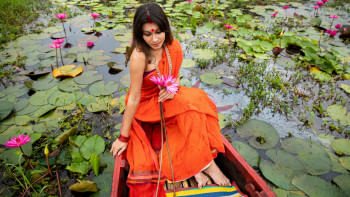
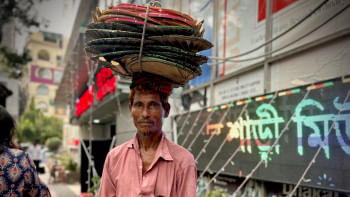

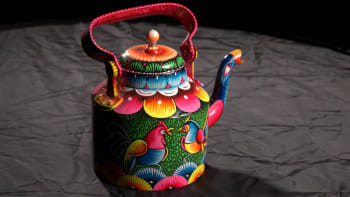


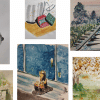
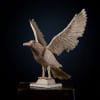

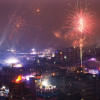
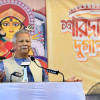
Comments